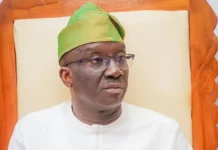By Sunny Awhefeada
The date 27th May is children day. The day’s preoccupation involves the children on one hand and parents, teachers and policy makers on the other. The children owe themselves celebrations manifesting in different forms of public displays that reflect their age and indulgences. Of course eating delicacies and drinking constitute part of the fun to which they subscribe. The other stakeholders constituted by parents, teachers and policy makers do the thinking and map a future for the children. Policy makers, in this case government, make grandiose speeches about their plans for the children and label them “leaders of tomorrow”. The children throng public grounds, participate in march-past and enthusiastically salute government people hoping and trusting that the former are worthy trustees of their tomorrow as it should be. In truth, government does have great plans and policies for the children and their future. And if those plans and policies were faithfully implemented the future of these children would be secured. Sadly, the policies lay cold in print in office drawers nationwide and the future of our children amble in jeopardy. Every year government people mount the rostrum to receive salutes from children and make speeches that elicit applause. Government houses also host parties for “their children” and brand such “children day party” when in truth the real Nigerian children who know what it means to be a Nigerian child are shut out of the gilded gates of such venues!
The Nigerian child is born into an embattled and dysfunctional milieu. Nigeria has been classified as one of the most unsafe places to give birth in the world. A doctor once remarked that birth cries are louder and harsher in Nigeria since the new babies know that they are being born into a battle ground. Infant mortality rate in Nigeria is 60 out of 1000 births. The number of out of school children is approximately 20 million. The figure of children enmeshed in multi-dimensional poverty is 63%. The Nigerian child is a victim or casualty of insecurity. Nigerian school boys have been killed in their sleep at Buni Yadi. Our daughters have been kidnapped while in school at Chibok and Dapchi. Nigerian children have been kidnapped on their way to write examinations. Terrorists, bandits and even the police torment Nigerian children. The police killed one of them last week. The majority of insurgents, bandits and kidnappers turning Nigeria into hell number among children the state did not cater for. They have now come of age and turned against the state in vengeance. Many Nigerian children have become orphans due to insecurity and would no longer experience the warm and reassuring embrace of a father or a mother. Nigerian children, to survive the malevolent vagaries of the polity, have become hawkers of wares and body. The Nigerian child is in a bad place.
The 28th of May is significant as the day the Economic Community of West African States (ECOWAS) was founded in 1975. The body turned fifty years two days ago. Was there a celebration? No! There was absolutely nothing to celebrate. Some of the leaders of ECOWAS gathered in Lagos like bedraggled vultures to memorialize the day. They had little or nothing to crow about because looking back they have not been able to achieve the dreams of the founding fathers of ECOWAS. Intended to foster economic cooperation and rapid development in the region, ECOWAS has failed on all fours. With the exception of ECOMOG peacekeeping missions in Liberia and Sierra-Leone which cost Nigeria a fortune, there are hardly thumbs up for a critical appraisal of ECOWAS. It also tried to stabilize Gambia’s democracy. That was all. Corrupt customs and immigrations officials have largely made free movement of people, goods and services uneasy. Its common currency ECO is yet to become a legal tender. Poor and bad leadership which deepened poverty and escalated unrest has led to the resurgence of military rule in the region. Four countries are under military dictatorship. ECOWAS is also disintegrating as three member states have realigned into Alliance of Sahel States (ASS). The only symbolic thing during the fiftieth anniversary was the reenactment of the Lagos Treaty of 1975 which signaled the establishment of the body. Nigeria’s former head of state, General Yakubu “Jack” Gowon who together with General Gnassingbe Eyadema of Togo birthed ECOWAS is still alive. Good old Jack attended the event in Lagos. What did he tell the heads of state? Did he tell them they have failed their people? With the deliberate muffling of history and relegation of civics I doubt if our children know about ECOWAS.
Nigeria returned to civil rule on 29th May 1999 after sixteen years of draconian military dictatorship that drove the country aground. Those who witnessed that day saw it as Nigeria’s second independence in view of the nation harrowing experience between 1983 and 1999. Today, not many people give a thought to 29th May 1999. What has happened since that day till now is akin to grand political larceny that has left the people disillusioned. The recurring failure of leadership, acute corruption and attendant near state failure has enacted a divorce between the majority of Nigerians and the Nigerian state. The people feel betrayed by the political class and ideals like patriotism and loyalty have receded in the reckoning of the former. This is more telling among the younger folks who are scrambling to flee Nigeria to countries like Ghana, Gambia, Burkina Faso and other places. This is twenty-six years into civil rule and it has not brought the desired dividends.
Part of Nigeria’s post-colonial ordeal was the civil war of 1967 to 1970. Not many people remember that the casus belli occurred on 30th May when Lt. Col. Chukwuemeka Ojukwu declared the republic of Biafra. Nigeria experienced a coup less than six years after independence. The coup bred consequences that led to the declaration of a new country by Ojukwu. What followed was the outbreak of war when the first gunshot was fired at Gakem on 7th July 1967. The war tested Nigeria’s unity, took lives and limbs and has today left a bitter memory and deep grievance. The trenchant and unending separatist agitation in the South-East is a disturbing aftermath of that war. The memory of that war is un-erasable.
Our lives as especially postcolonials are defined by historical hiccups. And we cannot run away from their realities and lessons. To run away is ironically to repeat them and encounter their bloody consequences. We must think about our past and learn lessons that will guide us. These dates matter. We must not obliterate them. As I write, word is making the round that one of those to whom we owe the inscription of Africa’s postcolonial condition has passed away. The man who gave us WEEP NOT CHILD is no more! Rest well Ngugi wa Thiong’o, once James Ngugi! tode ooo!!!
























